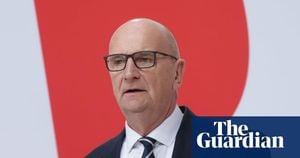Germany has witnessed one of its most consequential elections since reunification, as the results of the 2025 Bundestagswahl reveal significant shifts in the political map. According to MDR, as the night unfolded, the Alternative für Deutschland (AfD) made unprecedented gains, asserting itself as the leading party across many regions, particularly in Central Germany. The party dominated the results, especially noted by their stellar performance of 38.6% of the vote in Thuringia and gaining all eight constituencies, marking history and raising eyebrows nationally.
The election, which took place on February 23, 2025, is noted for achieving the highest voter turnout since the reunification of Germany, with participation rates recorded at 84%, as highlighted by ARD and ZDF. This surge indicates heightened political engagement among citizens, partially fueled by the contentious political climate leading up to the election.
Evoking mixed feelings, outgoing Federal Chancellor Olaf Scholz, representing the Social Democrats (SPD), commented on his party's drop to 16.4%, reflecting on this harsh outcome as "a bitter result" for the SPD as they dealt with drastic losses compared to their previous performance. Scholz stated during post-elections, "We must go together as we move forward, even amid this defeat."
Friedrich Merz, the frontrunner for the CDU, celebrated his party’s triumph, which garnered approximately 28.5% of the total votes, positioning them as the clear leader at the end of the night. He said, "Thank you for the mandate we have received to govern; the people have chosen change. Now, we must act swiftly on coalition discussions as the world doesn’t wait."
This election marks a significant turning point at which the FDP, led by Christian Lindner, faced severe backlash, falling below the 5% threshold with only 4.9% of the vote, leading Lindner to announce his retreat from active politics. His departure signifies a symbolic end to the coalition's previous leadership, reflecting discontent among the traditional liberal base.
Adding to the results mix, the Left party secured noticeable wins, with Bodo Ramelow reclaiming his seat as the representative for Weimar, indicating resilience amid broader party challenges. On the other hand, the Green Party, facing losses, racked up 12% but poised for discussions on future collaborations.
Commenting on the electoral shifts, experts and analysts note the stronghold of the AfD, where its leader Alice Weidel proclaimed, "We have achieved the strongest results yet, demonstrating our deep connection and commitment to the electorate. The populous has expressed its will to our vision."
Regions such as Sachsen-Anhalt mirrored this trend, with recorded AfD figures at 38.5%, as local party leadership expressed enthusiasm over their significant growth, underscoring the party's reach beyond previous election cycles. Union General Secretary Carsten Linnemann confirmed, "A political reset is underway. The societies’ needs are shifting, and so must our approach to governance."
Overall, the discourse surrounding the voting patterns indicated substantial voter migration between parties, as statistics show the Union gaining over 1.8 million votes from the SPD alone, showcasing the shifting loyalties among constituents. Freiburg's figures are particularly alarming for the existing coalition parties, who struggled to present coherent platforms during the run-up to the elections.
Among the voting populace were approximately 59.2 million eligible voters across Germany, with significant engagement from younger voters making their debut at the polls. This diverse participation reflects broader demographic changes and voter expectations from their representatives.
Despite the notable victories for the AfD, all eyes are now on coalition dynamics. According to reports, potential partnerships between parties remain endlessly debated as political leaders must carefully navigate complex negotiations to form the next government. While Merz and the CDU aim for streamlined discussions, Lindner's departure complicates prospects for direct links with the FDP.
Reiner Haseloff, the Minister-President of Sachsen-Anhalt, reinforced the need for rapid government formation, expressing concerns over the AfD’s rising influence, saying, "We can’t ignore the resounding calls for change; it's time for responsible leaders to step up. We must focus on creating stability or risk unforeseen challenges come 2029."
The political ramifications of this election are yet unclear, but it symbolizes awakening pressures within German society for change and reform, propelled by the actions and words of its citizens. The results strongly underline the necessity for traditional parties to reassess their strategies and engagement with voters to maintain relevance.
The outcome of the 2025 Bundestagswahl highlights pivotal junctures for Germany’s political future as any extended delays in talks could lead to complications within governance structures moving forward, with analysts asserting all parties must rise above petty disputes to lead effectively.
With the dust settling on this transformative election, Germany stands on the precipice of redefining its political identity, making the next steps taken by leaders even more significant for all involved.



